REKLAMA
Monitor Polski - rok 2003 nr 39 poz. 575
ROCZNA UMOWA FINANSOWA NA ROK 2002
między Rzecząpospolitą Polską a Komisją Wspólnot Europejskich dotycząca Specjalnego Programu Akcesyjnego na rzecz Rozwoju Rolnictwa i Obszarów Wiejskich (SAPARD) w Polsce,
sporządzona w Brukseli dnia 3 kwietnia 2003 r.
Rząd Rzeczypospolitej Polskiej, występujący w imieniu oraz na rzecz Rzeczypospolitej Polskiej, zwanej dalej „Rzecząpospolitą Polską”, z jednej strony, oraz
Komisja Wspólnot Europejskich, zwana dalej „Komisją”, występująca w imieniu oraz na rzecz Wspólnoty Europejskiej, zwanej dalej „Wspólnotą”, z drugiej strony,
zwane dalej łącznie „Umawiającymi się Stronami”,
zważywszy, że:
(1) Specjalny Program Akcesyjny na rzecz Rozwoju Rolnictwa i Obszarów Wiejskich (zwany dalej „SAPARD”), zapewniający udział finansowy Wspólnoty, został ustanowiony na mocy rozporządzenia Rady (WE) nr 1268/1999 w sprawie wspólnotowych środków pomocowych na rzecz działań przedakcesyjnych w dziedzinie rolnictwa i rozwoju obszarów wiejskich w państwach Europy Środkowej i Wschodniej ubiegających się o członkostwo w Unii Europejskiej w okresie przedakcesyjnym1;
(2) Plan przedłożony przez Rzeczpospolitą Polską został zatwierdzony jako Program Rozwoju Rolnictwa i Obszarów Wiejskich na mocy decyzji podjętej zgodnie z postanowieniami art. 4 ust. 5 rozporządzenia Rady (WE) nr 1268/1999 w dniu 18 października 2000 r.;
(3) Wieloletnia umowa finansowa pomiędzy Rzecząpospolitą Polską a Komisją Wspólnot Europejskich występującą w imieniu Wspólnoty Europejskiej, zwana dalej „Wieloletnią umową finansową pomiędzy Rzecząpospolitą Polską a Wspólnotą”, zawarta w dniu 18 maja 2001 r., przewiduje w artykule 2, że określenie finansowego zobowiązania Wspólnoty nastąpi w Rocznych umowach finansowych;
(4) Konieczne jest określenie finansowego zobowiązania Wspólnoty na rok 2002 w celu realizacji w Rzeczypospolitej Polskiej Programu Rozwoju Rolnictwa i Obszarów Wiejskich (zwanego dalej „Programem”) i wszelkich zmian w tym Programie oraz ustalenie okresu ważności zobowiązania. Z uwagi na to, że rozszerzenie Wspólnoty może nastąpić w trakcie okresu wypłat z tytułu zobowiązania finansowego na rok 2002, przyjęto środki ostrożności w celu ograniczenia okresu, w którym Agencja SAPARD może zawierać nowe kontrakty ze wszelkimi beneficjentami w celu zapewnienia odpowiedniego przejścia od instrumentów finansowania w ramach SAPARD do nowych form wsparcia rozwoju obszarów wiejskich w Rzeczypospolitej Polskiej po jej przystąpieniu do Unii Europejskiej. Odbywa się to bez uszczerbku dla postanowień ewentualnego Traktatu Akcesyjnego;
(5) Art. 12 ust. 4 rozporządzenia Rady nr 2500/2001 z dnia 17 grudnia 2001 r. zmienił rozporządzenie Rady nr 1268/1999, rozszerzając na osoby fizyczne i prawne z Cypru, Malty i Turcji prawo do uczestnictwa w przetargach i kontraktach zawieranych m.in. w ramach programu SAPARD na tych samych warunkach, jakie mają zastosowanie w odniesieniu do wszystkich osób fizycznych i prawnych z państw członkowskich oraz z krajów będących beneficjentami tego programu. W związku z powyższym istnieje potrzeba rozszerzenia na te kraje wyżej wymienionego prawa oraz zapewnienia im możliwości stosowania postanowień wywodzących się z tego samego źródła co te, które przyznano wszystkim krajom kandydującym;
(6) W świetle doświadczeń i opinii zdobytych od dnia podpisania Wieloletniej umowy finansowej między Rzecząpospolitą Polską a Wspólnotą, konieczne wydaje się wprowadzenie określonych zmian w tej umowie. W szczególności wskazane jest dostosowanie postanowień dotyczących wyboru projektów mających być przedmiotem finansowania w ramach określonych przedsięwzięć;
uzgodniły, co następuje:
Art. 1
Przedmiot
Niniejsza umowa określa zobowiązanie finansowe Wspólnoty wobec Rzeczypospolitej Polskiej na rok 2002. Wprowadza ona także zmiany do Wieloletniej umowy finansowej między Wspólnotą a Rzecząpospolitą Polską, podpisanej w dniu 25 stycznia 2001 r., z późniejszymi zmianami.
Art. 2
Zobowiązanie
Wkład finansowy Wspólnoty w roku 2002 ogranicza się do kwoty 179 874 468 euro. Zobowiązanie to może zostać wykorzystane wyłącznie w celu realizacji Programu, zgodnie z Wieloletnią umową finansową zawartą między Rzecząpospolitą Polską a Wspólnotą.
Art. 3
Okres zobowiązania
Najpóźniej do dnia 31 grudnia 2004 r. Komisja automatycznie wycofa się z jakiejkolwiek części zobowiązania, o którym mowa w art. 2, która nie została uregulowana poprzez płatność na rachunek bankowy lub co do której nie otrzymała ona możliwego do przyjęcia wniosku o dokonanie płatności.
Z zastrzeżeniem postanowień, jakie mogą zostać zapisane w Traktacie Akcesyjnym Rzeczypospolitej Polskiej, Agencja SAPARD nie może zawierać z żadnym beneficjentem kontraktów związanych z niniejszą umową, angażujących fundusze wspólnotowe, po określonej dla tego kraju dacie zawarcia kontraktów dotyczących formy pomocy na rzecz rozwoju obszarów wiejskich Rzeczypospolitej Polskiej jako członka Unii Europejskiej.
Art. 4
Zmiany Wieloletniej umowy finansowej
W Wieloletniej umowie finansowej zawartej między Rzecząpospolitą Polską a Komisją wprowadza się następujące zmiany:
1. Art. 8 otrzymuje brzmienie:
„Artykuł 8
Punkty kontaktowe
1. Korespondencję dotyczącą wszelkich spraw, z wyjątkiem informacji określonej w załączniku I do rozdziału F, wchodzących w zakres Wieloletniej umowy finansowej lub zakres Rocznych umów finansowych, o których mowa w art. 2, ze wskazaniem, tam gdzie to właściwe, numeru i tytułu programu, należy adresować w sposób następujący:
dla Rzeczypospolitej Polskiej:
Urząd Komitetu Integracji Europejskiej
Al. Ujazdowskie 9
00-918 Warszawa
Telefon: 00 48 22 694 68 07
Faks: 00 48 22 625 03 80
dla Wspólnoty:
Commission of the European Communities
Directorate General Agriculture
SAPARD Unit
Rue de la Loi 130, B – 1049 Brussels
Telephone: 00 32 2 296 73 37
Fax: 00 32 2 295 17 46
E-mail: agri-sapard@cec.eu.int
2. Korespondencję dotyczącą informacji określonej w załączniku I do rozdziału F, wchodzącej w zakres Wieloletniej umowy finansowej lub zakres Rocznych umów finansowych, o których mowa w art. 2, ze wskazaniem, tam gdzie to właściwe, numeru i tytułu programu, należy adresować w sposób następujący:
dla Rzeczypospolitej Polskiej:
Ministerstwo Finansów
Biuro Międzynarodowych Relacji Skarbowych
ul. Świętokrzyska 12
00-916 Warszawa
dla Wspólnoty:
European Commission
European Anti-Fraud Office (OLAF)
Directorate C
30, Rue Joseph II
B – 1049 Brussels”.
2. W rozdziale A:
– w art. 5 ust. 7 otrzymuje brzmienie:
„7. W odniesieniu do inwestycji w projekty, z wyłączeniem projektów infrastrukturalnych, które nie generują znaczących dochodów netto, Agencja SAPARD zapewni, aby dla każdego projektu objętego Programem suma przyznanej pomocy publicznej pochodzącej ze wszystkich źródeł nie przekroczyła 50% całkowitych kosztów kwalifikowanych. Środki przeznaczone na szkolenia są traktowane jako rozwój kapitału ludzkiego, a nie jako inwestycje w rozumieniu niniejszego ustępu.”,
– w art. 8 w ust. 1 litera (b) otrzymuje brzmienie:
„(b) na podstawie deklaracji wydatków poniesionych przez beneficjenta, udokumentowanych oryginałami faktur z odnotowaniem lub innymi odpowiednimi dokumentami, tam gdzie, zgodnie z Programem, pomoc nie jest funkcją wydatków. Tego rodzaju deklaracje obejmują jedynie wydatki lub, w przypadku gdy pomoc nie jest funkcją wydatków, zdarzenia mające miejsce nie wcześniej niż w dniu zawarcia kontraktu, które sprawiają, że ubiegający się o pomoc staje się beneficjentem odpowiedniego projektu w ramach Programu, z wyjątkiem analiz możliwości wykonania i analiz pokrewnych oraz przedsięwzięć z zakresu pomocy technicznej. Z wyjątkiem przedsięwzięć w ramach pomocy technicznej, wydatki w żadnym przypadku nie odnoszą się do wybranych projektów, kontraktów zawartych przez lub w imieniu Agencji SAPARD i beneficjentów oraz wydatków poniesionych przed dniem określonym w decyzji Komisji, o której mowa w art. 3 ust. 1 niniejszego rozdziału. Jeżeli Agencja SAPARD nie przechowuje przy odbiorze oryginałów faktur lub innych stosownych dokumentów, o których mowa w niniejszym punkcie, to zapewnia ona sporządzenie ich kopii i sprawia, że oryginały będą dostępne w celu przeprowadzenia audytu i kontroli.”,
– w art. 10 w ust. 1 litera (b) otrzymuje brzmienie:
„(b) w odniesieniu do dokonanych przez Agencję SAPARD nadpłat oraz nieściągniętych przez nią długów, jak również długów niepobranych w terminie dwóch lat od ich zaksięgowania w księdze głównej dłużnika, zastosowanie ma kurs obowiązujący w przedostatnim dniu roboczym Komisji w miesiącu poprzedzającym miesiąc, w trakcie którego po raz pierwszy odnotowano nadpłatę lub dług;”,
– w art. 14 punkt 2.6 otrzymuje brzmienie:
„2. 6. Przepisy dotyczące zamówień publicznych na usługi, roboty i dostawy w Rzeczypospolitej Polskiej podlegają wymogom zgodności z zasadami określonymi w podręczniku Komisji pt.: „Kontrakty na usługi, dostawy i roboty zawarte w ramach współpracy Wspólnoty z krajami trzecimi”2. Nie stosuje się jednak wymogu ich uprzedniej akceptacji przez Komisję. Zamówione usługi, roboty, maszyny i dostawy powinny pochodzić ze Wspólnoty lub z krajów wymienionych w punkcie 8 rozdziału F.”,
– dodaje się następujący artykuł:
„Artykuł 16
Wyjątkowe klęski żywiołowe
1. Pod warunkiem że rozporządzenie Rady nr 1268/1999 zostało odpowiednio zmienione, Komisja, po ustaleniu, że wyjątkowa klęska żywiołowa dotknęła Rzeczpospolitą Polską, może na podstawie jej uzasadnionego wniosku wyrazić zgodę na wysokość wspólnotowego dofinansowania do całkowitej pomocy publicznej dla właściwych projektów w dotkniętym regionie i na określony okres, przewyższającą wysokość określoną w Programie, ale mieszczącą się w granicy górnego pułapu 85%. Co więcej, Komisja może zezwolić na odstępstwa od następujących postanowień niniejszego rozdziału umowy:
a) pod warunkiem, że rozporządzenie Rady nr 1268/1999 zostało odpowiednio zmienione, próg 50% określony w art. 5 ust. 6 i 7 może zostać zastąpiony progiem w wysokości do 75%;
b) w akapicie drugim art. 7 ust. 5, wnioski o dodatkowe płatności na rachunek mogą opierać się również na szacunkach potrzeb wynikających ze spodziewanych skutków wyjątkowej klęski żywiołowej;
c) w art. 8 w ust. 1 lit. b):
– wymóg udokumentowania deklaracji wydatków poniesionych przez beneficjenta poprzez faktury z odnotowaniem, może zostać zastąpiony przez formalną decyzję Agencji SAPARD w sprawie poparcia projektu. Kryteria dla takich decyzji powinny zostać wyszczególnione w uzasadnionym wniosku przedłożonym przez Rzeczpospolitą Polską i zatwierdzonym przez Komisję. Beneficjent musi podjąć się, w okresie nieprzekraczającym jednego roku, dostarczenia deklaracji w sprawie wydatków rzeczywiście poniesionych, o których mowa w art. 8 ust. 1 lit. b). Żadna płatność na rzecz jakiegokolwiek beneficjenta nie może przekroczyć, zgodnie z niniejszym odstępstwem, 20% całkowitego kosztu inwestycji zatwierdzonej przez Agencję SAPARD i każda taka płatność stanowi przedmiot odpowiednich poręczeń;
– postanowienie ograniczające deklaracje wydatków do zdarzeń mających miejsce nie wcześniej niż w dniu zawarcia kontraktu, sprawiających, że ubiegający się o pomoc staje się jej beneficjentem, zastępuje się przez ograniczenie do zdarzeń mających miejsce nie wcześniej niż w dniu nadejścia wyjątkowej klęski żywiołowej;
d) w art. 14 punkt 2.6, obowiązek zgodności zamówień publicznych na usługi, roboty i dostawy z podręcznikiem Komisji może zostać zastąpiony przez mniej uciążliwe postanowienia, włączając te, które dopuszczają procedury zamówień w drodze negocjacji stron, gdzie władze konsultują się z wybranymi przez siebie dostawcami i negocjują warunki kontraktów z jednym lub kilkoma z nich.”.
3. W rozdziale B:
– w art. 4 dodaje się następujący ustęp:
„6. W przypadku gdy Komisja ustali, że wyjątkowa klęska żywiołowa dotknęła Rzeczpospolitą Polską, może ona, na podstawie uzasadnionego wniosku Rzeczypospolitej Polskiej, zatwierdzić, dla właściwych projektów w dotkniętym regionie i na określony okres, odstępstwa od postanowień ustępów 2 lit. e), 3 lit. b) i c) oraz 4.”,
– w art. 6 ust. 2 otrzymuje brzmienie:
„2. Monitoring prowadzi się w odniesieniu do odpowiednich wskaźników fizycznych, środowiskowych i finansowych. Wskaźniki podlegające monitoringowi, dotyczące nakładów i wyników Programu, dotyczą szczególnego charakteru udzielanej pomocy, jej celów oraz sytuacji społeczno-gospodarczej, strukturalnej i środowiskowej w Rzeczypospolitej Polskiej.”,
– w art. 8 w ust. 5 lit. c) dodaje się następujący tiret:
„(v) dane wykazujące, że środki wspólnotowe nie zastąpiły finansowania dostępnego w Rzeczypospolitej Polskiej;”.
4. W rozdziale C dodaje się następujący artykuł:
„Artykuł 8
Układy Europejskie
Rzeczpospolita Polska zapewnia, aby w przypadku każdego rodzaju pomocy publicznej, która zniekształca lub zagraża zniekształceniem konkurencji poprzez faworyzowanie niektórych przedsiębiorstw i produkcji niektórych dóbr, przyznanej w ramach programu SAPARD i dotyczącej produktów innych niż wymienione w Części III, rozdziałach II i III Układu Europejskiego, postanowienia art. 633 Układu Europejskiego były przestrzegane.”.
5. W rozdziale D tabela A1 (dołączona jako załącznik III) jest załączona do formularza D-1.
6. W rozdziale F:
– lista krajów wymieniona w pozycji 8 kolumna (e) otrzymuje brzmienie:
„Bułgaria, Cypr, Czechy, Estonia, Litwa, Łotwa, Malta, Polska, Rumunia, Słowacja, Słowenia, Turcja i Węgry.”,
– postanowienia podpunktu 7.3, pozycja 7.3.1, kolumna (e) otrzymują brzmienie:
„7.3.1. W ciągu dwóch miesięcy po zakończeniu każdego kwartału Rzeczpospolita Polska zgłasza Komisji wszelkie nieprawidłowości, które podlegają wstępnemu ściganiu administracyjnemu lub sądowemu. Sprawozdanie to składa się w postaci formularza określonego w załączniku I do niniejszego rozdziału.”,
– postanowienia podpunktu 7.5, pozycja 7.5.1, kolumna (e) otrzymują brzmienie:
„7.5.1. W ciągu dwóch miesięcy po zakończeniu każdego kwartału, Rzeczpospolita Polska, przy użyciu formularza określonego w załączniku I do niniejszego rozdziału oraz powołując się na wszelkie poprzednie sprawozdania złożone na mocy podpunktu 7.3, informuje Komisję o postępowaniach podjętych w następstwie stwierdzenia zgłoszonych uprzednio nieprawidłowości i istotnych zmianach z nich wynikających.”,
– załącznik I do niniejszej Rocznej umowy finansowej stanowi załącznik I do rozdziału F Wieloletniej umowy finansowej.
Art. 5
Wejście w życie
Niniejsza umowa wchodzi w życie w dniu, w którym obydwie Umawiające się Strony powiadomią się nawzajem o dokonaniu wszelkich formalności koniecznych do jej zawarcia.
Art. 6
Podpisanie umowy
Niniejsza umowa zostaje sporządzona w dwóch egzemplarzach, każdy w językach polskim i angielskim, przy czym tekst w języku angielskim uważany jest za rozstrzygający.
Sporządzono w Brukseli, dnia 3 kwietnia 2003 r.
| W imieniu Rzeczypospolitej | W imieniu Komisji Wspólnot |
| Polskiej: | Europejskich: |
| Danuta HÜBNER Sekretarz Stanu | Franz FISCHLER Członek Komisji |
| Sekretarz Komitetu Integracji Europejskiej |
|
|
|
1 Dz. U. WE nr L 161 z 26.06.1999, s. 87–93.
2 SEC 1999 1801/2.
3 OJ L 348 z 31.12.1993, s. 0002–0180.
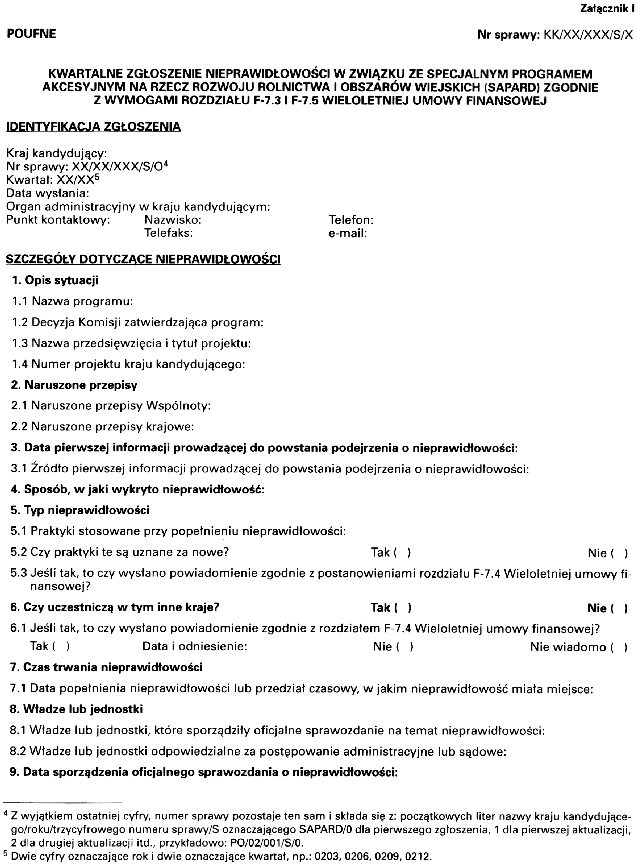
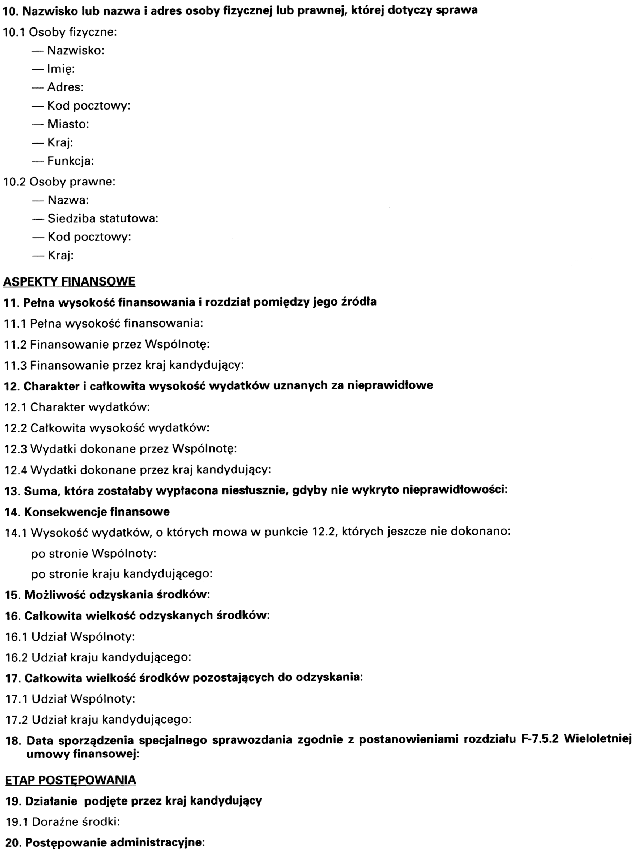
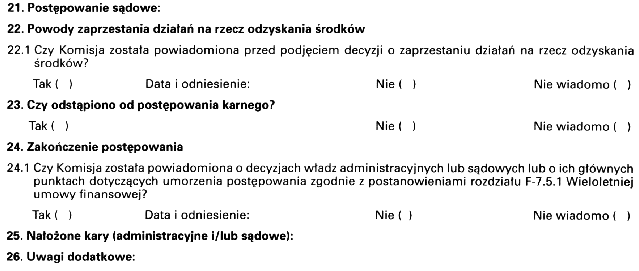
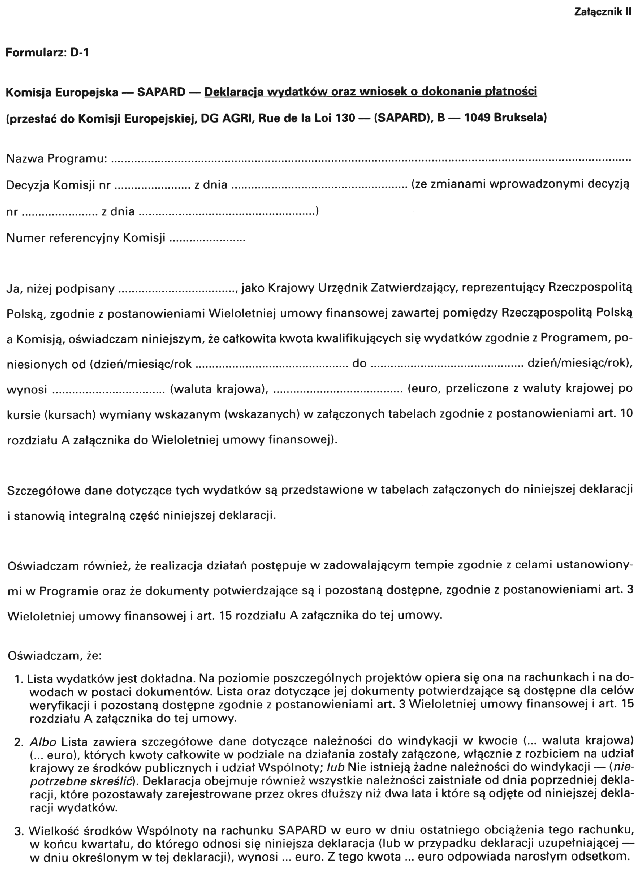
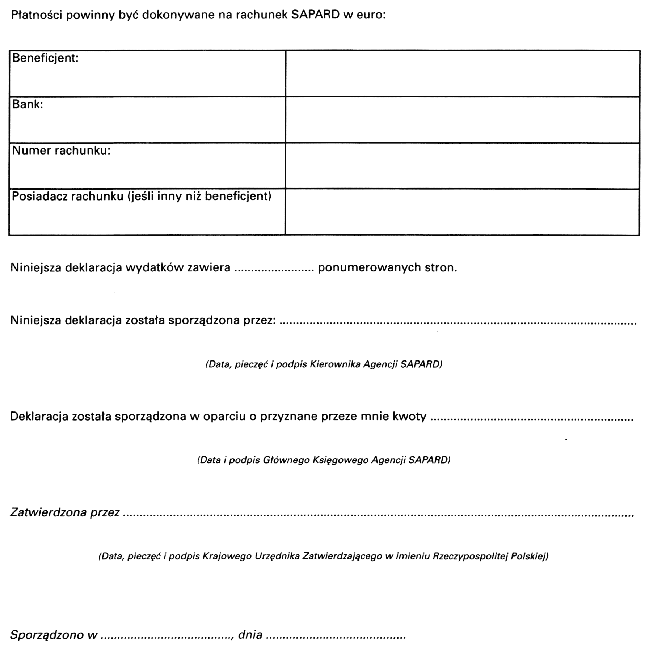
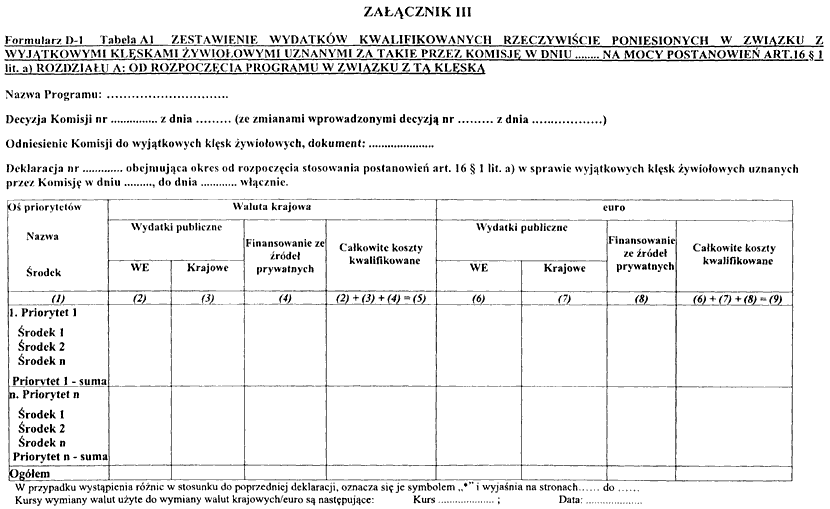
ANNUAL FINANCING AGREEMENT 2002
SPECIAL ACCESSION PROGRAMME FOR AGRICULTURE AND RURAL DEVELOPMENT IN THE REPUBLIC OF POLAND (SAPARD)
between the Commission of the European Communities on behalf of the European Community and the Republic of Poland
The Commission of the European Communities, hereinafter referred to as "the Commission", acting for and on behalf of the European Community, hereinafter referred to as "the Community" of the one part, and
The Government of the Republic of Poland acting for and on behalf of the Republic of Poland, hereinafter referred to as "the Republic of Poland" of the other part,
and together jointly referred to as "the Contracting Parties",
Whereas:
(1) A Special Accession Programme for Agriculture and Rural Development (hereinafter referred to as "SAPARD") providing for a Community financial contribution has been established by council Regulation (EC) No 1268/1999 on Community support for pre-accession measures for agriculture and rural development in the Applicant Countries of central and eastern Europe in the pre-accession period1;
(2) The plan submitted by the Republic of Poland was approved as an Agriculture and Rural Development Programme by a Decision taken in accordance with Article 4 (5) of Council Regulation (EC) No 1268/1999 on 18 October 2000;
(3) The Multi-Annual Financing Agreement between the Commission of the European Communities acting on behalf of the European Community and the Republic of Poland, hereinafter referred to as the Multi-Annual Financing Agreement between the Community and the Republic of Poland, has been concluded on 18 May 2001 and provides in Article 2 that the financial commitment of the Community shall be set out in Annual Financing Agreements;
(4) It is necessary to set out the Community financial commitment for the year 2002 for the execution of the Agriculture and Rural Development Programme, and any amendments thereof, (hereinafter referred to as ,,the Programme"), in the Republic of Poland, and to state the period of validity of that commitment. As enlargement of the Community may take place within the period of validity for payments of the 2002 financing commitment, the precaution is taken to limit the period for entering into new contracts by the SAPARD Agency to any beneficiary, in order to ensure a proper transition between the SAPARD instrument and any new form of assistance for rural development for the Republic of Poland as a member of the European Union. This is done without prejudice of the outcome of any possible Act of Accession;
(5) Article 12 (4) of Council Regulation No 2500/2001 of 17 December 2001 modified Council Regulation No 1268/1999 by extending to natural and legal persons from Cyprus, Malta and Turkey the right to participate in invitations to tender and contracts inter alia under SAPARD on the same terms that apply to all natural and legal persons from Member States and beneficiary countries. It is therefore necessary to extend to these countries that right and to allow them to enjoy the same origin provisions as granted to all Applicant Countries;
(6) In the light of the exceptional natural disasters causing flooding in August 2002, of experience gained and comments made since signature of the Multi-Annual Financing Agreement between the Community the Republic of Poland, it appears necessary to make certain other adjustments to that agreement. In particular it is appropriate to adjust the provisions concerning project selection for certain measures;
HAVE AGREED AS FOLLOWS:
Article 1
Objective
This Agreement sets out the Community financial commitment for the Republic of Poland for the year 2002. It also modifies the Multi-Annual Financing Agreement signed on 25.01.2001, as amended.
Article 2
Commitment
The financial contribution of the Community for the year 2002 is limited to 179.874.468 euro. This commitment is valid only for execution of the Programme in conformity with the Multi-Annual Financing Agreement between the Community and the Republic of Poland.
Article 3
Period of commitment
The Commission shall automatically decommit any part of the commitment referred to in Article 2 which has not been settled by a payment on account, or for which it has not received an acceptable payment application, by 31 December 2004 at the latest.
Without prejudice to provisions which may be laid down in an Act of Accession for the Republic of Poland, no contract involving Community funds relating to this Agreement shall be entered into by the SAPARD Agency with any beneficiary later than the date for this country to enter into contracts involving a form of assistance for Rural Development for the Republic of Poland as a member of the European Union.
Article 4
Modification of the Multi-Annual Financing Agreement
The Multi-Annual Financing Agreement concluded between the Commission and the Republic of Poland, is modified as follows:
1. Article 8 is replaced by the following:
"Article 8
Contact Points
1. Correspondence relating to any matter, except information set out in Appendix I to Section F, falling within the scope of this Multi-Annual Financing Agreement, and/or the scope of the Annual Financing Agreements provided for in Article 2, where appropriate stating the Programme's number and title, shall be addressed to the following:
for the Community:
Commission of the European Communities
Directorate General Agriculture
SAPARD Unit
Rue de la Loi 130, B – 1049 Brussels
Telephone: 00 32 2 296 73 37
Fax: 00 32 2 295 17 46
E-MAIL: agri-sapard@cec.eu.int
for the Republic of Poland:
Office of the Committee for European Integration
(Urząd Komitetu Integracji Europejskiej)
Al. Ujazdowskie 9
00-918 Warsaw
Telephone: 00 48 22 694 68 07
Fax: 00 48 22 625 03 80
2. Correspondence relating to information set out in Appendix I to Section F, falling within the scope of this Multi-Annual Financing Agreement, and/or the scope of the Annual Financing Agreements provided for in Article 2, where appropriate stating the Programme's number and title, shall be addressed to the following:
for the Community:
European Commission
European Anti-Fraud Office (OLAF)
Directorate C
30, Rue Joseph II
B – 1049 Brussels
for the Republic of Poland:
Ministry of Finance
(Ministerstwo Finansów)
Bureau for International Treasury Relations
(Biuro Miedzynarodowych Relacji Skarbowych)
ul. Świętokrzyska 12
00-916 Warsaw"
2. In Section A
– Article 5 (7) is replaced by the following:
"7. In respect of investments in projects except those in infrastructure of a type not generating substantial net revenue, the SAPARD Agency shall ensure that for any project under the programme the cumulation of public aid granted from all sources does not exceed 50% of total eligible cost. Measures for training are considered to be human capital and not investment for the purposes of this paragraph."
– In Article 8 (1) the point (b) is replaced by the following:
"(b) based on declarations of expenditure incurred by the beneficiary evidenced by original receipted invoices or other relevant documents where, according to the Programme, aid is not a function of expenditure. Such declarations shall include only expenditure or, in the case where aid is not a function of expenditure, events occurring no earlier than the date the contract was concluded making the claimant a beneficiary under the Programme for the project concerned, except as regards that for feasibility and related studies and for the Technical Assistance measure. Except for actions under the Technical Assistance measure, expenditure shall in no case relate to projects selected, contracts concluded by or on behalf of the SAPARD Agency and beneficiaries, and expenditure paid earlier than the date(s) specified in the Commission Decision referred to in Article 3 (1) of this Section. Where original invoices or the other relevant documents referred to in this sub-paragraph are not retained by the SAPARD Agency following receipt, the SAPARD Agency shall ensure that copies shall be taken and arrangements made to ensure that the originals will be made available for audit and inspection purposes."
– In Article 10 (1) the point (b) is replaced by the following:
"(b) for overpayments by the SAPARD Agency and for debts not recovered by the SAPARD agency, as well as debts that have not been collected within 2 years of their registration in the debtor's ledger, the rate on the last but one working day at the Commission in the month preceding the month during which the overpayment or the debt were first noted."
– In Article 14 the point 2.6. is replaced by the following:
"2.6. The rules for the procurement by public bodies of services, works and supplies in the Republic of Poland shall be consistent with the rules set out in the Commission manual entitled "Service. Supply, and Work Contracts concluded within the Framework of Community Co-operation for the Third Countries2". However, the requirement for ex-ante approval by the Commission included therein shall not apply. The services, works, machinery and supplies procured shall originate in the Community or in the countries referred to in Item 8 of Sect on F."
– The following Article is added:
”Article 16
Exceptional natural disasters
1. Provided Council Regulation 1268/1999 has been modified accordingly, the Commission may, in the event that it determines that an exceptional natural disaster has affected the Republic of Poland, on the basis of a reasoned request by the Republic of Poland authorise, for relevant projects in the region affected and for a specified period, rates of Community co-financing to total public aid above those specified in the Programme but within the ceiling of 85%. Moreover, the Commission may authorise derogations from the following provisions of this Section of the Agreement:
a) provided Council Regulation No 1268/1999 has been modified accordingly, the 50% thresholds as provided for in Article 5 (6) and (7) may be replaced by thresholds of up to 75%;
b) in Article 7 (5) second sub-paragraph, requests for additional payments on account may also be based on estimates of needs flowing from the expected impact of the exceptional natural disaster;
c) in Article 8(1) (b):
– the requirement for declarations of expenditure incurred by the beneficiarv to be evidenced by receipted invoices may be replaced by a formal decision by the SAPARD Agency to support the project. The criteria for such decisions shall be specified in the reasoned request submitted by the Republic of Poland and approved by the Commission. The beneficiary must undertake within a period not exceeding one year to provide declarations of expenditure actually incurred as provided for in Article 8 (1) (b). No payment to any beneficiary pursuant to this derogation may exceed 20% of the total cost of the investment approved by the SAPARD Agency and any such payment shall be the subject of appropriate guarantees;
– the provision limiting expenditure declarations to events occurring no earlier than the date the contract was concluded making the claimant a beneficiary shall be replaced by a limit of no earlier than the date the exceptional natural disaster occurred;
d) in Article 14 point 2.6, the obligation for procurement by public bodies of services, works and supplies to be consistent with the Commission manual may be replaced by less onerous provisions including those permitting negotiated procedures whereby authorities consult providers of their choice and negotiate the terms of the contract with one or more of them."
3. In Section B
– In Article 4 the following paragraph is added:
"6. In the event that the Commission determines that an exceptional natural disaster has affected the Republic of Poland it may on the basis of a reasoned request by the Republic of Poland authorise, for relevant projects in the region affected and for a specified period, derogations from provisions of paragraphs 2 (e), 3 (b) and 3 (c), and 4 above."
– Article 6 (2) is replaced by the following:
"2. Monitoring shall be carried out by reference to relevant physical, environmental and financial indicators. These monitoring indicators, concerning the inputs and the outputs of the Programme, shall relate to the specific character of the assistance concerned, its objectives and the socio-economic, structural and environmental situation the Republic of Poland."
– In Article 8 (5) (c) the following indent is added:
"(v) data to demonstrate that Community funds have not replaced funding available in the Republic of Poland."
4. In Section C the following Article is added:
"Article 8
Europe Agreements
The Republic of Poland shall ensure that for any public aid which distorts or threatens to distort competition by favouring certain undertakings or the production of certain goods granted under SAPARD, which concern products other than those referred to in Title III, Chapters II and III of the Europe Agreement, Article 633 of the Europe Agreement are respected."
5. In Section D the Table A1 (attached as Annex III) is annexed to the Form D-1.
6. In Section F
– The list of countries set out in item n° 8 column (e) is replaced by the following:
"Bulgaria, the Czech Republic, Estonia, Hungary, Latvia, Lithuania, Poland, Romania, Slovakia, Slovenia, Cyprus, Malta and Turkey."
– The provisions in sub-item 7.3 under 7.3.1. column (e) are replaced by the following:
"7.3.1. During the two months following the end of each quarter, the Republic of Poland shall report to the Commission any irregularities, which have been the subject of initial administrative or judicial investigations. This report shall be presented in accordance with the form in Appendix I to this Section."
– The provisions in sub-item 7.5 under 7.5.1. column (e) are replaced by the following:
"7.5.1. During the two months following the end of each quarter, the Republic of Poland shall inform the Commission, using the form in Appendix I to this Section and with reference to any previous report made under sub-item 7.3, of the procedures instituted following all irregularities previously notified and of important changes resulting therefrom."
– The annex I to this Annual Financing Agreement is attached as Appendix I to Section F of the Multi-Annual Financing Agreement.
Article 5
Entry into Force
This Agreement shall enter into force on the date when both Contracting Parties have notified each other of the completion of all necessary formalities for its conclusion.
Article 6
Signature
This Agreement shall be drawn up in duplicate in English and in Polish, only the English text being authentic.
Done at Brussels, this third day of April in the year two thousand and three.
| For the Commission | For the Republic |
| Franz FISCHLER | Danuta HÜBNER Secretary of State Secretary of the Committee for European Integration |
|
|
1 OJ L 161, 26.06.1999, p. 87–93.
2 SEC (1999) 1801/2.
3 OJ L 348, 31.12.1993, p. 0002–0180.
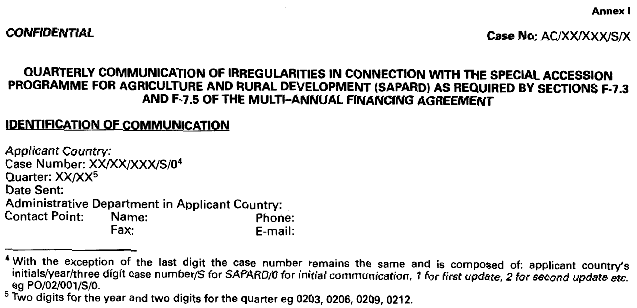
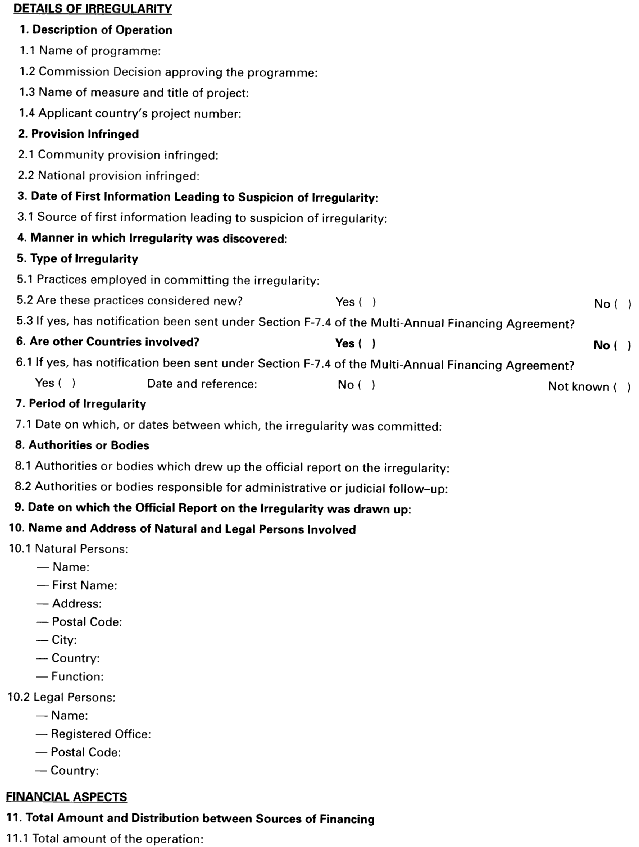
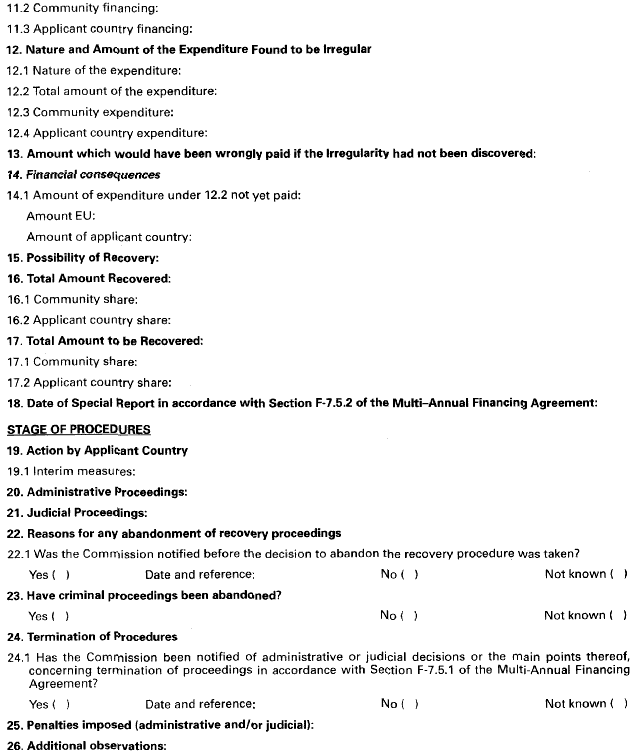
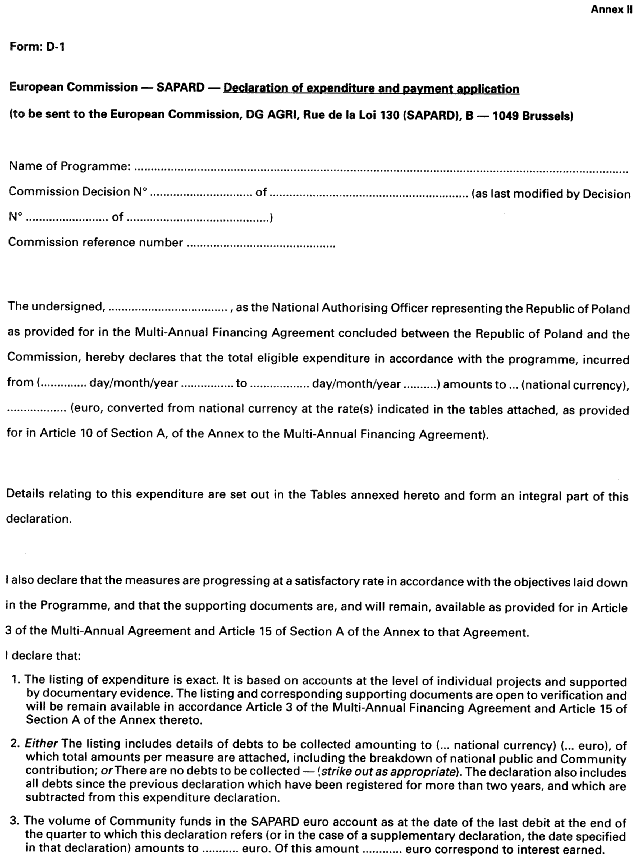
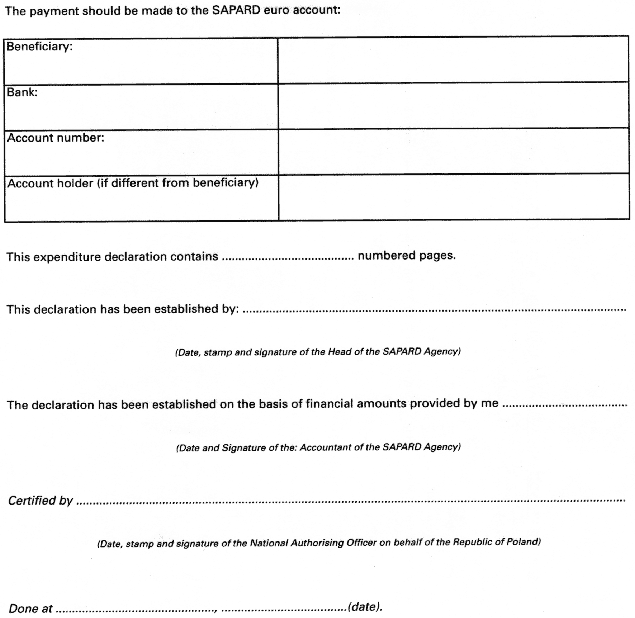
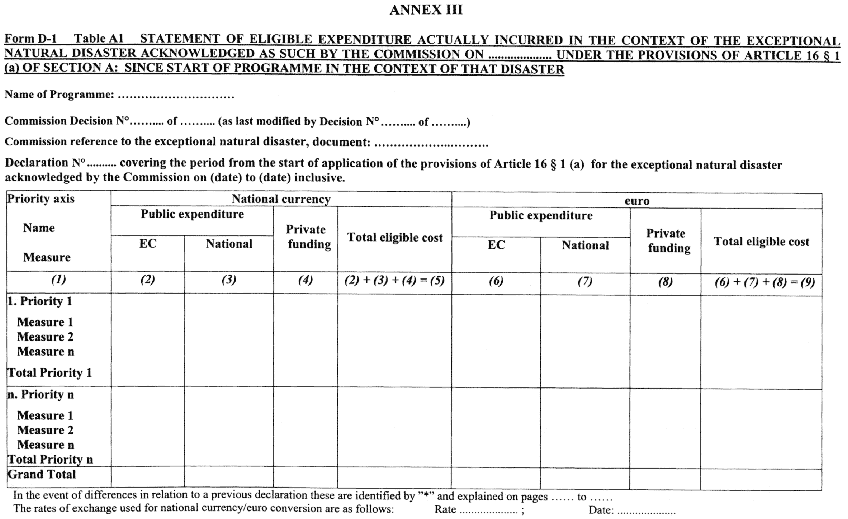
- Data ogłoszenia: 2003-08-05
- Data wejścia w życie: 2003-04-14
- Data obowiązywania: 2003-06-05
REKLAMA
Monitor Polski
REKLAMA
REKLAMA

